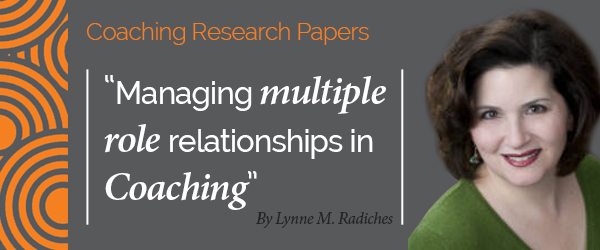
(Self-Care Coach, UNITED STATES)
Managing Multiple Role Relationships In Coaching Without Compromising Effectiveness Or Integrity
Synopsis
The purpose of this paper is to raise awareness of the challenges associated with dual or multiple relationships between coaches and clients, and to provoke and promote thoughtful discussion among coaches who may, as a result, be inspired to prevail over such challenges.
Introduction
The neutrality and absence of judgment exercised by a good coach notwithstanding, a coach’s role is one of support and encouragement. Strong connections between coach and client can develop as early as the first session. A coach’s caring must be genuine. Boundaries can become blurred. This paper is about dual or multiple non-professional relationships between coaches and clients.[1] A comparison to dual or multiple relationships between therapists and clients will also be explored. Several personal experiences of ICA coaches will also be shared.
Multiple or Dual Relationships Defined
A life coach who holds more than just the coaching role with the client has a dual, or multiple, role with that client. One example might be when the coach and client are also friends. Other examples include, but are not limited to, the coach and client who are relatives; business associates; have children who attend school or engage in extracurricular activities together; or are involved in the same organization. If the dual relationship exists as the coaching is taking place, it is said to be concurrent. If an additional relationship begins after the coaching relationship has ended, it is said to be sequential.
The International Coach Federation
The Core Competencies and Code of Ethics are but two professional guidelines from the International Coach Federation (“ICF”) available to coaches. Each includes parameters within which a coach may prudently engage in a multiple role relationship with a client.
The ICF Core Competencies
The ICF imparts its expertise to professional coaches in its Core Competencies. Below are excerpts from two of the sections from the ICF Core Competencies as relate to the professional relationship between coach and client.
B. CO-CREATING THE RELATIONSHIP
3. Establishing Trust and Intimacy with the Client – Ability to create a safe,supportive environment that produces ongoing mutual respect and trust.
- Shows genuine concern for the client’s welfare and future;
- Continuously demonstrates personal integrity, honesty and sincerity;
- Establishes clear agreements and keeps promises;
- Demonstrates respect for client’s perceptions, learning style, personal being;
- Provides ongoing support for and champions new behaviors and actions, including those involving risk taking and fear of failure;
- Asks permission to coach client in sensitive, new areas.
Most prospective clients seek a coach who will be respectful, empathetic, supportive, and keep confidences. These are the qualities people often seek in friends, as well. It is not a stretch to imagine a person wanting to be coached by someone whom he or she already knows and trusts as a friend. Likewise, a coach and client who have developed a professional relationship based on trust and excellent communication between them may wish to extend their relationship to other areas of common interest, such as a club or organized social activity.
The co-creation of a coaching relationship is comparative in a broad sense to the development of a friendship or professional business relationship. The exchange of communication between client and coach, that is for honoring the client’s agenda and not that of the coach – with the coach reserving all judgment and refraining from any attempt to influence, distinctively separates the coaching relationship from any other type relationship between the same people.
C. COMMUNICATING EFFECTIVELY
5. Active Listening – Ability to focus completely on what the client is saying and is not saying, to understand the meaning of what is said in the context of the client’s desires, and to support client self-expression.
- Attends to the client and the client’s agenda, and not to the coach’s agenda for the client;
- Hears the client’s concerns, goals, values and beliefs about what is and is not possible;
- Distinguishes between the words, the tone of voice, and the body language;
- Summarizes, paraphrases, reiterates, mirrors back what client has said to ensure clarity and understanding;
- Encourages, accepts, explores and reinforces the client’s expression of feelings, perceptions, concerns, beliefs, suggestions, etc.;
- Integrates and build on client’s ideas and suggestions;
- “Bottom-lines” or understands the essence of the client’s communication and helps the client get there rather than engaging in long descriptive stories;
- Allows the client to vent or “clear” the situation without judgment or attachment in order to move on to next steps.
Effective communication is important to any successful relationship. For a coach, that means meeting and maintaining the obligation to focus only on the client’s agenda in an attentive, earnest, and honest way, and without judgment or attempt to influence the client in any way. Unlike the give and take of many relationships, coaching sessions are all about the client. The coach has an important role as facilitator when working with people seeking focus, strategy, and motivation.
The ICF Code of Ethics
For the coach faced with potential conflicts of interest, the ICF Code of Ethics is useful. Part Two, Sections 2 and 3, of the ICF Standards of Ethical Conduct states, in pertinent part,
9) I will seek to avoid conflicts of interest and potential conflicts of interest and openly disclose such conflicts. I will offer to remove myself when such a conflict arises.
11) I will only barter for services, goods or other non-monetary remuneration when it will not impair the coaching relationship.
——————————-